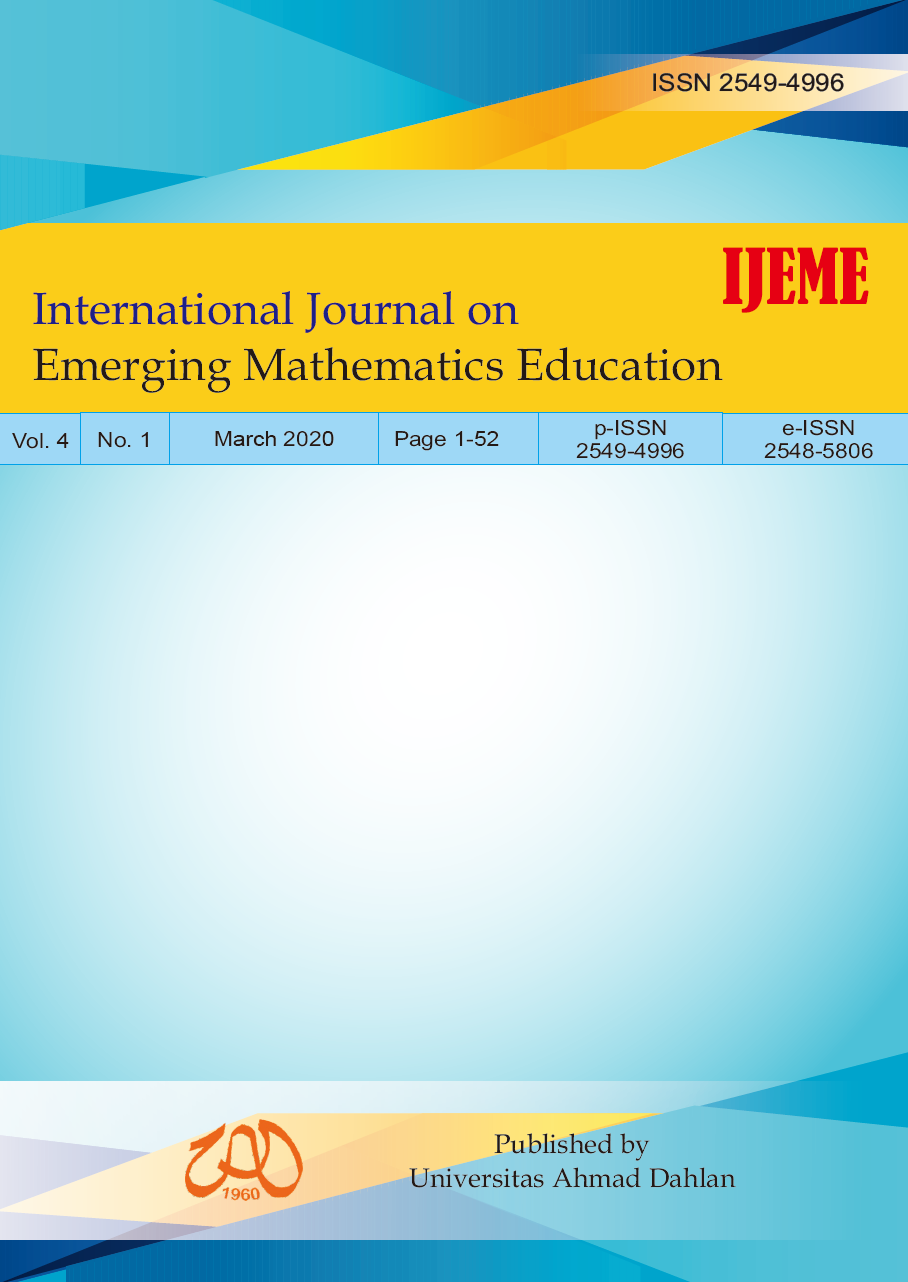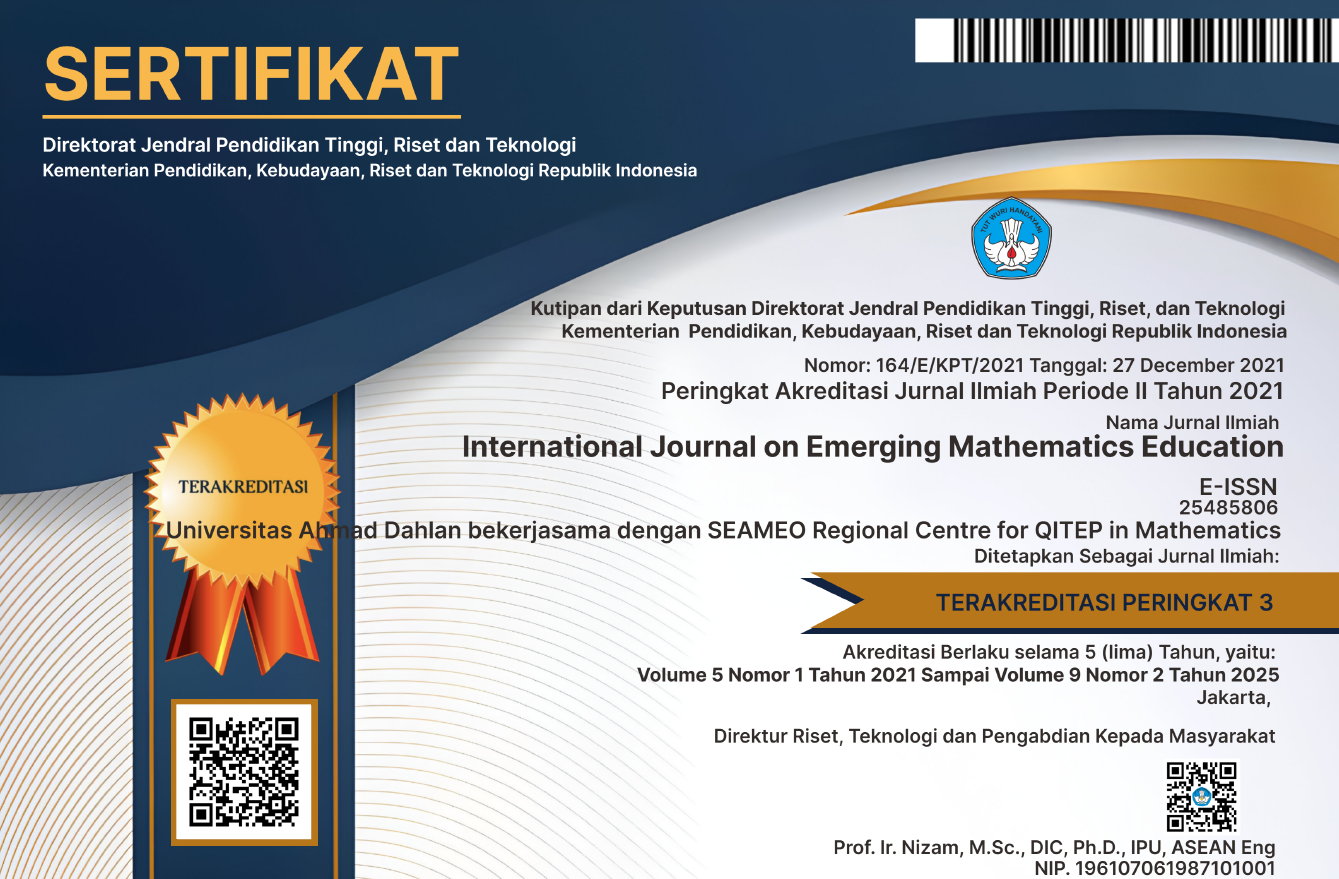Development of Multiplication and Division Concept Learning Media to Increase Student’s Problem Solving Skill and Learning Interest
DOI:
https://doi.org/10.12928/ijeme.v4i1.15764Keywords:
Dakon learning media, Learning interest, Problem Solving AbilityAbstract
This study aims to (1) find out the quality of the learning media of dakon in mathematics subjects in class II-A of SD Muhammadiyah Ambarbinangun (2) determine the effectiveness of students learning using dakon media. The research method is research and development. The results of this study indicate that 1) The quality of learning media in terms of the review are a) the results of the assessment of media experts scored 65 with excellent criteria. Material experts score 36 with good criteria. b) the results of the student response questionnaire obtained a percentage of 93% with excellent criteria. 2) the learning process has been effectively reviewed from: a) the average results of student interest in learning by obtaining a percentage of 89% with outstanding criteria. b) the ability to solve problems, there are differences, as evidenced by the Paired Sample T-Test on the value obtained Sig. (2-tailed) 0,000 <0.05. The media of the dakon is effective in improving problem-solving skills and interest in learning, seen from the average score of 67.95 pretests and 83.28 post-test so that it can be concluded that the effective learning media.
References
Agus, T. (2011). Pendidikan Anak di SD. Jakarta: Universitas Terbuka.
Amabarjaya, B. S. (2012). Psikologi Pendidikan & pengajaran teori & praktik. Jakarta: CAPS.
Anggraini, C. M., Warniasih, K., & Jana, P. (2019). Development of Student Work Sheets Based on Contextual Learning to Facilitate Mathematic Concept Understanding Skill of Junior High School Student 7th Grade. Formatif: Jurnal Ilmiah Pendidikan MIPA. https://doi.org/10.30998/formatif.v9i1.2773
Asra, & Sumiati. (2009). Metode Pembelajaran. Bandung, Jawa Barat, Indonesia: CV. Wacana Prima.
Fad, A. (2011). Kumpulan Permainan Anak Tradisional Indonesia. Jakarta: Cerdas Interaktif.
Fitriani, K., & Maulana. (2016). Meningkatkan Kemampuan Pemahaman Dan Pemecahan Masalah Matematis Siswa Sd Kelas V Melalui Pendekatan Matematika Realistik. Mimbar Sekolah Dasar, 3(1), 40–52. https://doi.org/10.17509/mimbar-sd.v3i1.2355
Heruman. (2008). Model Pembelajaran Matematika. Bandung, Jawa Barat, Indonesia: PT Remaja Rosdakarya.
Hurlock, E. B. (2003). Perkembangan Anak jilid 2. Jakarta: Erlangga.
Ibrahim, & Suparni. (2012). Pembelajaran Matematika Teori dan Aplikasinya. Yogyakarta: SUKA-Press UIN Sunan Kalijaga.
Istikomah, D. A., & Jana, P. (2019). Mathematical Prolem Solving Ability in Apos Modified Learning Model ( M-APOS ). Journal of Physics: Conference Series, 1254(2019), 1–6. https://doi.org/10.1088/1742-6596/1254/1/012071
Jana, P., & Fahmawati, A. A. N. (2020). Model Discovery Learning untuk Meningkatkan Kemampuan Pemecahan Masalah. Aksioma Jurnal Pendidikan Matematika FKIP Univ. Muhammadiyah Metro, 9(1), 213–220. https://doi.org/http://dx.doi.org/10.24127/ajpm.v9i1.2157
Kurniawan, I. (2017). Model Pembelajaran Kooperatif Melalui Permainan Dakon Termodifikasi untuk Meningkatkan Motivasi Belajar Siswa. JURNAL PENELITIAN PENDIDIKAN MATEMATIKA, 1(2), 148–155. https://doi.org/https://doi.org/10.32502/jp2m.v1i2.1489
Putri, T. A. S. D., & Chandra, J. C. (2018). Penerapan Algoritma Minimax dalam Permainan Dakon Pada SD Negeri 04 Pondok Ranji. Skanika, 1(2), 836–841. Retrieved from http://jom.fti.budiluhur.ac.id/index.php/SKANIKA/article/view/298
Ruseffendi, E. T., & Dkk. (1991). Pendidikan Matematika 3. Jakarta: Depdikbud.
Soedjadi. (2000). Kiat Pendidikan Matematika di Indonesia. Jakarta: Direktorat Jendral Pendidikan Tinggi Departemen Pendidikan Nasional.
Sudjana, N., & Rivai, A. (2008). Media Pengajaran. Bandung, Jawa Barat, Indonesia: Sinar Baru Algensindo Bandung.
Sugiyono. (2011). Metode Penelitian Kuantitatif, Kualitatif dan R&D. Bandung, Jawa Barat, Indonesia: Alfabeta.
Sulaiman, A. (2013). Penerapan Media Permainan Dakon Dalam Peningkatan Hasil Belajar Berhitung Siswa Kelas 1 SD Al-Amin Surabaya. Jurnal Penelitian Pendidikan Guru Sekolah Dasar, 1(1), 1–7. Retrieved from https://jurnalmahasiswa.unesa.ac.id/index.php/jurnal-penelitian-pgsd/article/view/2031
Usman. (2014). Aktivitas Metakognisi Mahasiswa Calon Guru Matematika dalam Pemecahan Masalah Terbuka. Didaktik Matematika, 1(2), 21–29.
Downloads
Published
How to Cite
Issue
Section
License
License and Copyright Agreement
In submitting the manuscript to the journal, the authors certify that:
- They are authorized by their co-authors to enter into these arrangements.
- The work described has not been formally published before, except in the form of an abstract or as part of a published lecture, review, thesis, or overlay journal. Please also carefully read the International Journal on Emerging Mathematics Education (IJEME) Author Guidelines at http://journal.uad.ac.id/index.php/IJEME/about/submissions#authorGuidelines
- That it is not under consideration for publication elsewhere,
- That its publication has been approved by all the author(s) and by the responsible authorities, tacitly or explicitly, of the institutes where the work has been carried out.
- They secure the right to reproduce any material that has already been published or copyrighted elsewhere.
- They agree to the following license and copyright agreement.
Copyright
Authors who publish with the International Journal on Emerging Mathematics Education (IJEME) agree to the following terms:
- Authors retain copyright and grant the journal the right of first publication with the work simultaneously licensed under a Creative Commons Attribution License (CC BY-SA 4.0) that allows others to share the work with an acknowledgment of the work's authorship and initial publication in this journal.
- Authors are able to enter into separate, additional contractual arrangements for the non-exclusive distribution of the journal's published version of the work (e.g., post it to an institutional repository or publish it in a book), with an acknowledgment of its initial publication in this journal.
- Authors are permitted and encouraged to post their work online (e.g., in institutional repositories or on their website) prior to and during the submission process, as it can lead to productive exchanges, as well as earlier and greater citation of published work.
![]()
Ciptaan disebarluaskan di bawah Lisensi Creative Commons Atribusi-BerbagiSerupa 4.0 Internasional.





